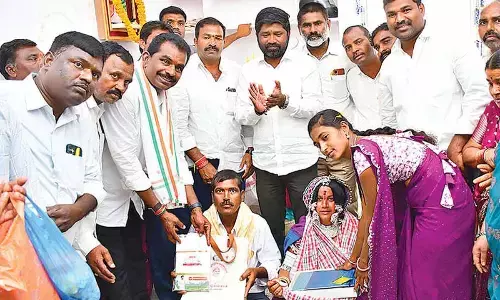NEP: A game-changer for India's higher education sector

NEP: A game-changer for India's higher education sector
The new National Education Policy has proven to redefine old-world ways of learning with its inclusive, multi-disciplinary approach and emphasis on holistic learning to build a nation that is economically strong, youth future-ready and socially aware
The New Education policy of 2020 outlines the vision of new-age education and multi-disciplinary learning, a step towards making India a 'global knowledge superpower' with colleges being enabled with more flexible, holistic, and multi-disciplinary which will bolster the economy of the country with skilled, employable youth. NEP will play a key role in streamlining learning for Higher Education in India, to align with their vision to increase their Gross Enrolment Ratio (GER). This acceleration in planning and introducing multidisciplinary education and Research Universities will in turn lead to better student outcomes, job opportunities etc. Between 2012-2017, it was estimated that not more than 5 per cent of Indians from the age group of 19 to 24 received formal vocational education in comparison to the countries like the USA which received 52 per cent, Germany 75 per cent, and South Korea 96 per cent, increased the gap for skilled, employable graduates.
As per the revised New Education Policy, students are free to choose from a combination of job oriented courses with a cross combination of programme frameworks, that will prepare students with applicable skills for the industry. The policy is directed towards holistic learning and development, thereby pivoting India's workforce to greater heights. Focus on vocational education and skill-based training is at the cornerstone of NEP, this allows students to truly explore their area of interest based on their aptitude for an enriching learning experience.
To give a gamut of experiences and offer flexible options for students, the crux of NEP is deeply rooted to provide an inclusive approach with a multi-lingual formula. It was earlier pointed out by the NEP that India's investment in research is less than 1 per cent of the Gross Domestic Product, to reverse this and to support higher education in research, the NEP envisioned two very significant roadmaps:
n To develop research capabilities among the faculty members and to facilitate the development of research culture in the state universities and other public institutions; and
n To seed and fund the peer-reviewed research studies with the establishment of National Research Foundation (NRF).
The NEP has mandated making research a part of the programme curriculum at the bachelor's and master's levels. This focus shift has provided education institutions the liberty to make learning more equitable and employable for students at large. While marks are important, NEP goes beyond ranks and numbers to assess the true capabilities of students. Several Universities now offer unique courses as primary subjects and electives such as Foreign Language, Yoga, Personality development, Data Science, Digital Marketing, Communication skills Agriculture etc. that not only enhance their skills but also nudge them towards entrepreneurship to become self-starters.
Giving students the power of choice, the policy enables students to either pursue three or four-year undergraduate degrees and higher education institutions offer Master's courses that go hand-in-hand with the new structural changes.
Under the purview of NEP, apprenticeship and on-the-job training play an equal role in accessing students and their capabilities, while making them job-ready on a global scale. The onus is on Universities and educational institutions to leverage partnerships with corporates to build an impactful industry-academia gateway. Multi-disciplinary education is the way forward to bringing more students to take up higher education courses by reaching out and being inclusive, especially to students who had found the offerings of higher education limiting. The HEI needs to be face-paced in their approach to making the course curriculum more comprehensive and offering it in regional languages, in a manner that is aligned to real-world needs, etc.
These are efforts they will have to make to enhance the Gross Enrolment Ratio (GER), for which India has a goal of 50 per cent by 2035. By adopting online and hybrid modes of education using – Study Webs of Active-learning for Young Aspiring Minds (SWAYAM), whose regulations permit up to 40 % of the course to be delivered online. Providing apprenticeship programmes or internships also sharpens the NEP and HEI's objective of enhancing employability. The new National Education Policy has proven to redefine old-world ways of learning with its inclusive, multi-disciplinary approach and emphasis on holistic learning to build a nation that is economically strong, youth future-ready and socially aware.
(The author
is the director at AISECT Group)










